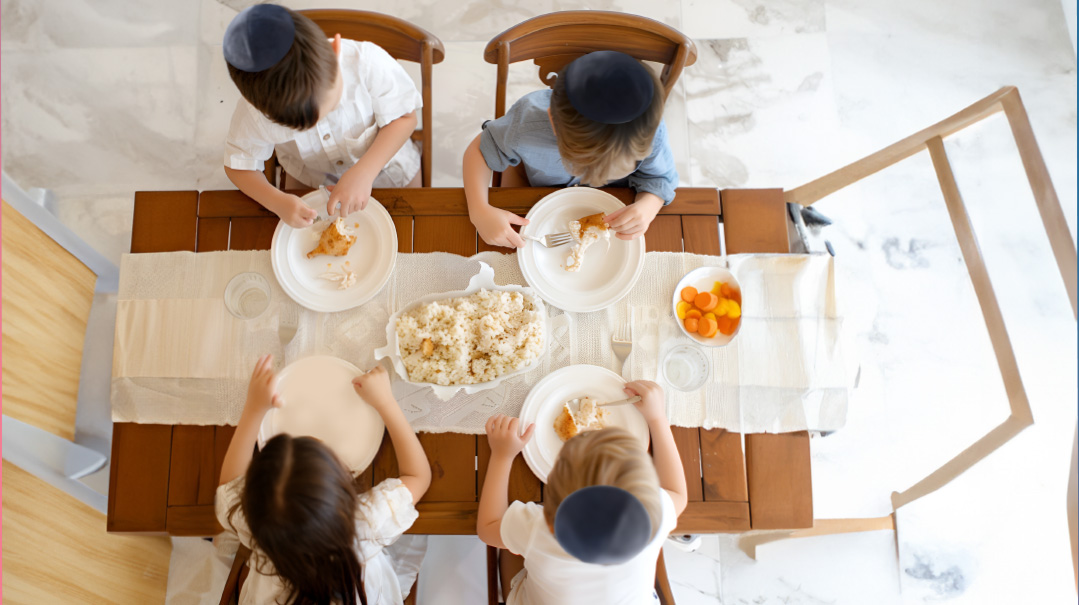Rescue Mission

I don’t want to get involved — but I need to

I
get it. A new baby is exciting.
What I don’t get is the difference between learning about my cousin Toby’s newest family member at 5 a.m versus at 7 a.m. While I’m asleep, especially during the last two precious hours before morning, I’m not all that news hungry. I can’t even know what I don’t know; I’m sleeping, for goodness’ sake.
I know it’s my fault. Why do I keep my phone next to my bed, right? Because I use it as my alarm clock, that’s why, and this morning, the mazel tov text wakes me at five, followed by an explosion of Mazel tov!!!! So exciting!!!! Lots of nachas!!! messages, because looks like other members of the family have been up and waiting for the news.
Plus, Toby happens to be my cousin on Yosef’s side as well, so I get double rounds of explosions. Yaaaaw— uh, yay.
I don’t reply until seven thirty. Just because Toby’s new baby stole my sleep doesn’t mean I should steal the sleep of others. When I send my mazel tov, I do it three times. Once on the Schaffer group, once on the Davidowitz group, and once privately to Toby, with my sincerest wishes and specific offers for help. Send me Leah for a week, she gets along so well with my Perlie.
Less than two minutes pass before Toby replies. You know something, Tamar? I might just take you up on that offer.
Nice. I love doing this kind of favor. I know how hard it is to come home to a houseful of kids with a newborn, and it’s really no big deal for me. Leah goes to school, she’s well-behaved as far as I know, and she’s five years old, pretty much independent. Having an additional kid around won’t stress me.
“We’re getting a guest this week!” I tell my kids as I pull out the toaster for breakfast.
Our guest shows up straight from school that day, with a pink oaktag mazel tov crown. “Maaaaaazel tov, Leah!” I squeal. Then, knowing what a kid who’s been farmed out to her cousins’ house needs most, I lift her in the air — tiny thing that she is — and embrace her.
Two things hit me.
One, her hand.
It hits me with startling unexpectedness, flat on my cheek.
I’m still processing what just happened — did I do something wrong by hugging her? — when the second thing hits me.
An odor. It hits like a wave. Her hair doesn’t smell right. I sniff again, cautiously.
Okay, someone needs a bath. She’d probably skipped one too many. I guess that happens when your mother’s approaching labor. I remember good and well what a wreck I’d been before I had my Efraim.
Perlie arrives home a few minutes later, and the two girls go off to play. I bustle around the kitchen, breading cutlets, cubing potatoes, mixing together a stir fry. I pop a container of frozen soup into a pot and set it to simmer.
An hour later, supper’s ready, and I call the kids to the table.
This is where my daily illusion disintegrates.
Sweet Mommy, delicious food, set table. But my kids are kids, and I face the supper battles with progressively eroding determination.
I’m so busy chasing Shifra around the kitchen trying to get her to take at least one bite that I don’t pay attention to our cute little guest. When I notice her, I see that she finished her entire soup, entire chicken cutlet, all of her mashed potatoes, and every last bit of the stir fry, which my kids consider mere decoration.
“Oh, wow, Leah!” I gush. “You ate so nicely! I’m so proud! I’m going to tell your Mommy what a good girl you are.”
Leah looks at me with the strangest eyes. They look almost… pathetic. “Can I have more?” she asks.
More?
Could this kid, like, please eat for my kids? Was she real or what?
“Uh, sure,” I say, a little too eagerly. A kid who eats like that, what a pleasure! “What would you like more of?”
“Everything.”
This time I turn to gape at her. The delight over her great eating habits dims into an uneasy curiosity. I’m quiet as I ladle more soup into her bowl and serve seconds of everything.
When she’s done, she and Perlie head back to the playroom. As they leave, I hear Leah ask my daughter, “You always eat four suppers in one night?”
The week progresses and my horror mounts.
Leah fights me when it comes to bathing. “The water is boiling!” she screams. I double check. It’s not.
I add cold water. She screams that it’s still too hot. Any more cold water and the bath would be freezing.
“Why do I need to take a bath?” she cries. “My mother never makes me!”
“Never?”
“Nope.”
“So when do you bathe?” I ask fearfully.
“Only when my Tatty makes me a glow-in-the-dark bath. But he almost never has time.”
A weakness settles over my limbs. I force her into that bath. I can’t put her to sleep otherwise.
Turns out, I can’t put her to sleep at all.
“Why do I have to go to bed now?”
She doesn’t ask it to challenge me. She’s genuinely surprised at the idea that someone is telling her to go to sleep.
“What time do you go to sleep at home?” I ask.
“When I’m tired. And my mother doesn’t make me sleep in a bed if I don’t want to.”
“So where do you sleep?”
“Anywhere. On the couch, on the rug next to the door, wherever I want.”
Two days into Leah’s stay, I sit in the car with Yosef. “Tell me what you know about Ezra and Toby Bochman.”
Yosef drives aimlessly. We do that sometimes, go “power walking” by car, because it’s too cold to actually walk outside and we need the quiet time together. “Not much,” he says. “Ezra’s on the quiet side. I know he works for an Amazon business. I know he’s chavrusas with Meir Abraham. I know where he davens. What else?”
“There’s something terrible going on in that house,” I tell him. “They need help. And I have a feeling that nobody knows.”
After that, Yosef picks up on clues. “She must’ve eaten fifteen wafers in a row,” he reports when I come home from PTA. “I wanted to stop her, but I was afraid she would make a scene.”
I have my own grim news to share. “I stopped in to say hello to her teacher at PTA. I told her I’m the cousin Leah’s staying with, and that her mother would call to do PTA over the phone. This teacher hesitated, and then she asked me if I know if there’s anything going on at home, because Leah’s kriah is a disaster and her mother dismisses her every time she brings it up.”
I also recall Leah’s reaction to my hug when she first arrived. She’d recoiled from any stroking or fond gestures the first three days of her stay, before learning to trust me. It was sadly obvious that the kid wasn’t used to any physical affection.
I feel sick. The shock of my discoveries keeps me up at night.
“We have to do something,” I keep repeating to Yosef. And he agrees, but we have no idea what that something is or how to go about this whole scary situation.
But we have no choice. We have to get involved. When the week is up and I hug Leah goodbye, she rips out of my grip and says, “Don’t tell me bye. I’m not going home.”
I know she doesn’t mean it. She doesn’t actually want to stay living with us. Still, the idea that a kid could entertain such a thought breaks my heart.
“Could I at least come here for a little bit every day?” she begs. “After school, to play with Perlie?”
She doesn’t begin to realize the brilliance of her idea.
“I’ll ask your mother,” I promise her.
When I talk to Toby about it, I milk the opportunity.
“Leah got along sooooo well with Perlie. And I know what the most overwhelming part of a new baby in the house is — that hour when the kids come home from school. So why don’t we have Leah come home to us for the next while, play with Perlie and maybe eat supper here, so you have one less kid to deal with at suppertime.”
Toby tries objecting, but I hear her silent plea. “Insist that I agree.”
When she does, I push my luck a little further. “And you know what? Send Rikki, too. They’re on the same bus, this way you won’t be tied down if you want to grab a nap or something.”
Rikki is three years old. She’s not an easy kid, I know that. She has extreme sensory issues, and I don’t remember ever being around her when she wasn’t crying.
Am I being impulsive? If I am, it’s too late to retract my words, because Toby all but pounces on the offer. “Just for a few days,” she tacks on quickly.
A few days. I can do this. I’m excited to do this.
My only reservation is the knowledge that my little good deed is just that: a little good deed. What will this accomplish in the long run? Toby’s kids won’t stay with us indefinitely. This family needs way more help than a few hours of babysitting.
Over the next few weeks, I learn two things:
One, Toby’s kids could stay with us indefinitely. At least, as long as I didn’t put an end to it. Because from Toby’s and the kids’ end, there doesn’t seem to be any plan for this arrangement ever coming to an end.
And two, if I don’t do something about the situation at the Bochmans’, the family is going to fall apart.
SO I do something. A lot of somethings. Small somethings and large somethings. Overt somethings and clandestine somethings.
First, I become “very good friends” with Toby. I realize from the get-go that in order to gain her cooperation, I need her to be on my team. To accomplish that, I become “vulnerable.” I start sharing my day-to-day struggles with her. How tough mornings could get. How burned-out I sometimes feel about doing the same things on repeat mode, like laundry, cooking, and cleaning. How much my children’s care and well-being demands of me, and how sometimes it’s really hard to divide myself into so many parts.
By sharing all this, and overly exaggerating each challenge, I get her to reciprocate. She finds my revelations so validating and shares how it is with her. I have to swallow back gasps when she divulges certain details, but of course, I let on that I consider these struggles normal. And at the same time, I tell her how I constantly work on myself to overcome each of these struggles. I teach her all my “hacks” and “systems” for housekeeping and house running and general mothering responsibilities.
But telling her about hacks and systems won’t get her far, so I get involved hands-on.
I start by taking her shopping, for herself and for her kids. I’ve been appalled at the condition of her girls’ clothing when they started coming to my house, so I start telling her about certain sales I want to check out, and does she want to come along with me?
The shopping trips turn into house visits. She hesitates to let me in at first, but I make sure to by-the-way be in her neighborhood and need to make a bathroom stop.
In her house, the discoveries are just too much.
Forget about her children’s nutrition; Toby herself is all but malnourished. A bag of candy is lunch. Dinner is whatever you choose or find in the house — for the kids as well as for herself. When I go “help myself to water from her fridge,” a quick scan determines that there isn’t a hint of a fruit or a vegetable in the house.
“I’m looking for a partner to join me on a new healthy-eating plan,” I disclose, to myself as well as to her.
If we’re partners, she’s game to try. Score, Tamar.
And the hygiene. I could barely sit down on a kitchen chair. There’s grime — dried yogurt? — caked on the upholstery.
I use a lot of creativity to address each issue. “Did you hear about the government program that offers free housekeeping?”
Two days later, cleaning help is arranged. Fiona shows up three times a week. I “happen to be around” the first two times — if Toby doesn’t know that I canceled on my kriah students for this, it won’t hurt her — and I train the woman to create and maintain a clean house.
Congratulations, me. I have turned into a government agency.
I know Toby realizes that this relationship isn’t exactly mutual. She can’t come out and openly express her gratitude, because that would mean admitting that I was helping her remap her life instead of enjoying a delightful give-and-take friendship. But when she summons the courage to openly solicit my help—“Do you think there’s anything wrong with Leah’s kriah? She’s only five years old, but her teacher is harassing me…”—that’s all the gratitude I need. I know she appreciates what I’m doing. I have no idea how many years it’s been since she’s lead a somewhat functional life.
“How does such a thing happen?” I repeatedly question Yosef. “I mean, these are normal people! I’ve known her all my life, maybe not like a sister, but like, we’re cousins, from both sides. I never suspected a thing!”
“There must be something behind it,” Yosef agrees. “And I think at this point, we should make an effort to find out what it is.”
It takes a little time to earn Toby’s confidence, and it’s a breakthrough when I manage to draw some information out of her. She tells me something about health issues, a challenging time, some vague mention of therapy.
After this conversation, Ezra approaches Yosef.
“I need to thank you for everything your wife does,” he tells my husband. “She’s… she’s a tzaddeikes. A total tzaddeikes.”
Yosef learns that Toby has been struggling since a certain episode four years earlier. “She forbids me from telling anyone,” Ezra reveals. He nearly breaks down as he talks. “She… I mean, I know we needed help, but she… held me back. I didn’t know what to do. I tried managing on my own, but I work long hours — we need the money! And I have no idea how to run a house. I’ve been so careful about keeping this a secret. There are times when things are better and times when they’re worse. But now that she told you….”
This explains so much. It also awakens an incredible sympathy, and a burning desire to help this poor family.
Yosef cheers me on. “You’re rescuing them from serious trouble, Tamar. Whether she shows appreciation or not, you need to realize that.”
He says you, but he’s being humble, because it’s him just as well. For one, he sponsors Fiona. That’s a serious turning point in the Bochmans’ lives. And he helps in so many other ways. He’s in touch with the hanhalah of the kids’ schools. He meets with Ezra’s rav regularly to brainstorm solutions. He also puts up with having Leah and Rikki around all the time, showering them with little gifts and lots of attention. I’ll be the first one to admit that it isn’t exactly easy.
Okay, who am I kidding? It’s not only not easy, it’s becoming a little impossible. It’s not like I’ve been sitting around twiddling my thumbs until the Bochmans came around. I have my own life. Running one household is a full-time job, plus I’m a kriah specialist, I work 15 hours a week. I feel guilty complaining, considering the blessings of my normal life, but frankly, I’m overwhelmed.
With nobody else to discuss this with, I find myself whining to Yosef all the time. “I don’t understand how nobody knows a thing,” I tell him once, when I return from the nits lady with seven-year-old Hadassah Bochman. The girl has been infested, who knows for how long? It had taken close to two hours to clean her head. By the time we finished, she was acting completely nuts, and I was close to tears myself.
Yosef is an annoying voice of reason. “Nobody knows the same way you never knew. They’ve done a great job at hiding what’s been happening. And none of this happened overnight. This is a buildup of four years of problems.”
It’s true. I hear it from Leah. She tells me that her father does the grocery shopping, and her father washes the laundry, and her father takes them to all their appointments. It’s obvious that Ezra has been holding down the fort on his own, to the best of his ability, for too long.
Several times, I wonder if it isn’t our duty to notify other members of the family. Toby’s parents and siblings live out of town, and I suspect they don’t realize what’s going on. I don’t feel comfortable approaching them anyway. “Maybe someone from Ezra’s side?” I suggest to Yosef. It’s becoming a little too much to juggle all this on our own.
Yosef is wary. “It’ll kill him,” he argues. “Ezra’s pride has held him back from reaching out for help all those years. If we’re capable of helping them on our own, I think it’s our onus to protect their privacy.”
So on top of twisting myself into a double-Mom pretzel, I’m forced to guard this terrible secret.
But as secrets tend to go, they usually don’t remain secret forever.
When Toby’s baby is three months old, I get a phone call from our mutual cousin, Chaya.
I’m at the seamstress with a bag of clothing — another little task in Mission Rescue the Bochmans — when the phone rings.
“Hey, Tamar, how aaaaaaare you?” Chaya sings.
“I’m great, baruch Hashem. And you?”
She doesn’t bother answering. “I’m calling about a cousin of ours that needs some… help.”
I step outside quickly. There’s something in her voice that makes my fingers grow clammy around the handle of the bag. She says that word help conspiratorially, like she’s letting me in on some sensational secret.
I don’t like this.
“It’s Toby,” Chaya reveals. “I don’t want to go into any details. Let’s just say that she’s having a little trouble… adjusting. After her baby, you know.”
I drop the bag weakly. I cannot breathe.
“So I started working on a, whatchamacallit,” Chaya says. “An extended meal train kind of thing. I mean, her baby is three months old, so it’s a little tricky…. Anyway, I’m calling to ask if you’d want to take a slot? I have Tuesdays and Wednesdays available. It’ll be every other week, so it doesn’t become too much for anyone.”
I have no idea how this happens. I have no idea how Chaya knows, or what she knows at all. (Adjusting after the baby — what a sad joke.) I need to get off the phone, quickly, and so I sign up for Wednesday, and there I am, on the meal train for the Bochmans.
It’s my first Wednesday, and I nearly forget.
I don’t forget the Bochmans — I never have that luxury — but I nearly miss my supper commitment. Which is beyond ironic, given that I did a supermarket run together with Toby at nine in the morning, before heading to work, and we’d shopped with the supper menu I’d written up for her in mind.
How do I tell Chaya that this meal train initiative is the worst thing that could happen in the Bochmans’ lives? It’s going to cripple them. It’s going to undo all the progress they’ve made so far.
Toby hasn’t said a word to me about it, which worries me. She’s been getting meals for the past two weeks, but since I supposedly know nothing about it, I continue guiding her through the shopping and the cooking that we’ve been working on all these months. What does she do with all the ingredients we stock up on? Why doesn’t she tell me that she’s getting help?
I race home from work to cobble together a meal. For my own family, I’d planned on serving what my kids call “breakfast for supper.” Rolls and salads and spreads, with some cheese latkes. My kids love it, and it gives me a break from cooking once in a while. But I can’t send this type of food to a “kimpeturin.” Wednesday is Universal Milchigs Night, and if I’m sending a meal, it means patchkening with spinach and pastas and fish.
Chaya’s volunteer driver shows up at four thirty to pick up the food. “We’re keeping it super confidential,” Chaya had explained. “I don’t want Toby finding out where the food is coming from.”
Her words made me want to laugh and cry at the same time.
Two weeks later, on my next turn, I send fleishigs. Too bad. Just too bad.
I’m on the phone with Toby as I drop meatballs into the pot. Something sizzles in my throat — I can’t call it cruelty, but maybe curiosity? — and I ask her, all casually, “What’s on the menu for supper tonight?”
“Um, I’m not sure yet,” she stammers. “I think we’ll maybe have… baked ziti? With salad? You said Wednesday is milchig, right?”
I said, ha.
You’re having meatballs and spaghetti, sweetie, and I wish you’d stop lying to me.
My kids are mad about the fleishig menu that night.
What should I tell them? I’d broken a cardinal balabusta rule, and for what? To aid the effort of ruining months of my hard work?
What I can’t tell them is the truth:
I’d planned on making baked ziti and salad.
ON my third Wednesday, as I’m finishing a session with one of my students, Chaya calls me.
“Confirming supper for tonight?”
I gather my session notes and stack them into a crisp pile.
“Confirmed,” I say tightly.
I hear her hesitate. “You know…” she says slowly, “it’s funny how this works. I mean, I don’t want you to take this the wrong way, I was just telling my husband….”
When someone tells you she was just telling her husband, it’s her way of saying, “I want to tell you something but I can’t say it to your face so I’ll do it in this sly, indirect way.” How do I know this? Because I do it all the time.
And I’m right. She wants to tell me something.
“I started this meal train, plus, uh… other things. To help Toby. And it’s weird, because I’m in touch with all our cousins these days, and like, I only asked everyone to pitch in once in two weeks, and although some people volunteered to do supper every week, nobody really, like, offered more. Like, nobody asked if there’s anything else they could do to help. I mean, Toby’s family doesn’t live nearby, so people should kind of realize that she doesn’t get that kind of support, and this whole… thing, the meal train, figuring out the schedule, calling to remind everyone when it’s their turn, making schedule changes to accommodate everyone. It all falls on me.”
Chaya is lucky that the recess bell rings. I need to go pick up my next student, Gila Friedler. I’m literally being saved by the bell.
“I have to go,” I tell Chaya abruptly.
I could barely focus on Gila during her session as Chaya’s shrilly voice and long-winded sentences spin around my head. Slowly, while Gila stutters her way through end-of-word pasachs, the accusation hits me.
You don’t do enough.
I’m so hurt, I want to cancel supper.
More, I want to call up Chaya and give her a huge piece of my mind, a 9×13-of-eggplant parmesan-sized piece, I think savagely, as I fry eggplant cutlets for Toby’s supper.
I want to tell Chaya about the months and months of hosting two extra children every afternoon, from school until bedtime. Feeding them supper, bathing them, doing homework with Leah, because I’m a kriah specialist, after all; Toby figured out this solution all on her own. Shopping for the Bochmans, arranging (and paying for!) steady cleaning help, scheduling dentist appointments — and being on top of Toby to actually take the kids to these appointments.
Months of careful sleuthing and delicate advising. Of teaching and coaching and supporting and giving. Of tearing myself in half, running two households at the same time.
And then, participating in this perfectly hazardous meal train idea, only to protect Toby’s privacy.
I layer eggplant, sauce, some broccoli, too much cheese. This eggplant parmesan is flavored with heaps of rage.
I can’t even call it a nisayon to refrain from calling her, though. For one, I know I can’t do it, because no matter how hurt I feel, talking to Chaya would mean telling her everything I know, and I wouldn’t betray Toby like that. And also, I am so terrifically disgusted, I don’t want to hear Chaya’s voice.
I’m in a rotten mood for the rest of the day. When Yosef comes home at six thirty, he orders me into bed. “I’ll serve myself supper and put the kids to sleep,” he says. “You look like you’re going to collapse.”
Ugh, what a way to greet a husband at the end of a day. I want to tell him what happened, but I hold it in. Sleep will probably accomplish more than venting. Besides, I don’t want to talk about it. I don’t want to think about it anymore.
When I wake up, I’m definitely feeling better. Sleep has this way of stimulating the logical part of the brain, so that I don’t suddenly think what Chaya said was exceptionally nice, but at least I can grudgingly understand that she’d said all that without having an inkling of what was really going on, or about my involvement in this situation.
Feeling more energized, I head to the kitchen to clean up. I thank Yosef for all his help—“Gosh, you rescued me, Yos, you’re the best”—and start on the dishes.
A little later, after Yosef leaves for night seder and I’m sweeping the kitchen floor, the phone rings.
It’s Toby.
Why do I not want to talk to Toby right now?
I answer the phone with a heavy reluctance.
“Thank you for supper,” Toby says icily.
It takes me a second to comprehend, but then I do, and….
What?
Weakly, I rest the broom on the fridge handle, and silently whistle, Oh dear.
“The broccoli gave it away,” she continues. “It’s my personal twist on eggplant parmesan, huh? Rings a bell?”
I don’t believe it. I’d taught Toby how to make eggplant parmesan, including my special broccoli twist, during one of my many cooking “classes.” How could I have forgotten?
There’s nothing to say. There’s no way to deny this.
“This organization calls me up, they offer supper for kimpeturins, so I figured, why not? Now I see who this ‘organization’ really is. Did you put an ad in the paper to get people to sign up?”
I can’t throw this on Chaya and expect Toby to believe me. I also can’t have her finding out that every one of her cousins is now in on her secret. So I stay quiet.
But Toby doesn’t. “Thank you for getting the entire world involved in my personal family matters. Silly me, I thought we were friends. Turns out, you’re the neighborhood chesed queen, and I am your poor, rachmanus, nebach case.”
Her voice is frothing now. “Bug off, Tamar,” she blurts in a livid whisper. “Don’t you dare meddle in my home and in my life.”
I bug off. Boy, do I bug off. I centipede-cockroach-water bug off.
My kids have questions. “Where are Leah and Rikki?” and, “You’re not going over to work out with Toby anymore?”
I used to give “working out” as an excuse whenever I ran over on my various rescue missions. We were working out, definitely, only not in the physical yoga-Pilates-cardio sense. We worked out systems and techniques and basic household functionality.
“Toby’s too busy,” I supply lamely.
It’s incredible how much free time I suddenly have on my hands.
And how much I hate it.
I tell myself it’s because I feel for Toby. How is she coping? Is she keeping up the methods I trained her into? Were all my efforts worth anything, or did she ditch everything I taught her as a form of retaliation?
But as the first week passes, with only one family’s Shabbos preparations to deal with, I admit to myself what it is that I hate so much.
It’s the unfairness of this story. Of this slap in the face.
On Motzaei Shabbos, we go visit Bubby Schaffer. My cousin Baila Gluckstein is there. “So which day do you send supper?” she asks conversationally.
I want to scream. First, because I wish she wouldn’t talk about sending supper. The whole supper saga makes me sick. I’m mad at Toby, I’m so mad at Chaya.
But also, I can’t stand this callousness. Why are Toby’s problems a conversation piece? If Chaya really had to go and launch her holy meal train, couldn’t she at least have sworn everyone to secrecy to protect Toby’s dignity?
The truth is, I’m surprised that the meal train is still on. I’d been sure Toby would cancel it, but so far, she continued accepting suppers every night.
To Baila, I mumble, “Wednesday,” and immediately turn my attention to my kid’s dripping ice cream.
Fine; if Toby doesn’t want my help, I’ll stay away. Let her go back to neglecting her home. Let her life fall apart.
But I need her — and Chaya — to know that this has all been one big mistake.
I need them to know that I’m not the villain here.
I’m the hero.
I’m the hero.
The word hero shadows me like some small print appendix.
I never considered myself a hero before.
Once, after Perlie’s brachos play in school, I bump into Leah’s teacher. “What’s happening with your niece, Leah Bochman?” she asks me. “She’d been making real progress over the past few months, but for the last little while, I feel like she’s falling behind again. Are you also seeing it?”
I’m seeing nothing. I’m the hero, but I’m not, not anymore. Now, I’m the scoundrel. The shunned traitor. The awful, terrible person who dared try to help a cousin in distress.
This is crazy. I am crazy. Nothing makes sense. Why am I being punished for my kindness?
I fumble my way out of the teacher’s confrontation, and then I make up my mind: I won’t accept it.
I can’t talk to Toby, I know that quite well. But I can talk to Chaya and clear my name.
The day drags as I count the minutes to when I can leave work and make the phone call. Why haven’t I done this right away? Let Chaya understand what she’s done here, let her know the truth about Toby — and about everything I’ve done for her. And let her talk sense into Toby, and get her to allow me to take back the reins.
My call goes to voicemail. Grr.
Chaya calls me back as I’m stepping into the house. “What’s up?” she asks. “I see you called.”
She sounds all chirpy. She’s in a good mood. She’s feeling like… like a hero.
I gear up to launch into my little rehearsed speech, but before I can say a word, bile rises to my throat.
I can’t do this.
I’ve done so much for Toby over the past few months. And I did it sincerely, with only the Bochmans’ interest at heart. Toby had needed something — so, so many somethings — from me, and I’d provided it.
And now….
Now Toby needs something else from me.
She needs me to stay away. To protect her pride. To provide her with what she perceives as dignity.
I’d done chesed with pure intentions. If I insist on maneuvering my way back into Toby’s life, it would be to exonerate myself from this sticky mess. To brush off my own ego and emerge looking like… a hero.
“You wanted something?” Chaya inquires.
I wanted something. Something so tempting. But I bury the desire in my heart, for now, because if this is all about Toby, then this is the chesed she needs from me now.
“Nothing special,” I tell Chaya. “Just about the meal train. I’d like to offer another day.”
(Originally featured in Family First, Issue 890)
Oops! We could not locate your form.







